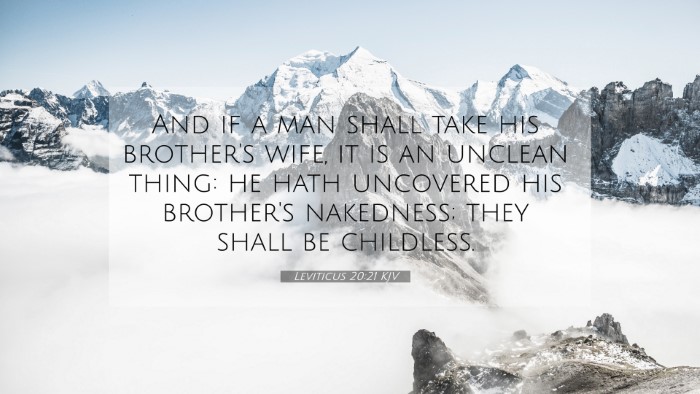Understanding Leviticus 20:21
Leviticus 20:21 states:
"And if a man shall take his brother's wife, it is an unclean thing: he hath uncovered his brother’s nakedness; they shall be childless."
Summary of Leviticus 20:21
This verse addresses prohibitions linked to unlawful sexual relations, particularly those involving a brother's wife. The underlying concerns include the sanctity of marital relations and the implications for familial relationships.
Commentary Insights
This verse is summarized from various public domain commentaries, highlighting its significance and implications:
-
Matthew Henry:
Henry emphasizes the moral imperative behind this commandment. Marrying a brother's wife not only violates familial bounds but also disrupts the family structure God intends. The scripture indicates that such actions carry serious consequences, including being childless, which can be seen as a form of divine judgment.
-
Albert Barnes:
Barnes interprets this prohibition as safeguarding the integrity of the family unit. He cites the seriousness of such unions in the context of the ancient societal structure, outlining that the consequences extend beyond personal guilt and impact lineage and heritage.
-
Adam Clarke:
Clarke delves into the spiritual implications of this verse, clarifying that uncovering one’s brother’s nakedness represents breaching a sacred trust. He notes that the phrase suggests deeper, spiritual connections in relationships and affirms the sanctity of marital fidelity.
Thematic Connections
Leviticus 20:21 has thematic connections with other Bible passages, allowing for extensive cross-referencing:
-
Genesis 38:8: This verse discusses the importance of family relations and the obligations tied to them.
-
Deuteronomy 25:5: Here, the duty of a brother to marry the widow of a deceased brother is addressed, highlighting familial responsibility.
-
1 Corinthians 5:1: Paul confronts incest in the Corinthian church, reflecting on the moral issues raised in Leviticus.
-
Hebrews 13:4: This verse underscores the sanctity of marriage and the severity of sexual sins, which aligns with the underlying message of Leviticus 20:21.
-
Malachi 2:15: This speaks to the brokenness that arises from unfaithfulness in marital relationships, tying back to the principles outlined in the Mosaic law.
-
Mark 10:11-12: Here, Jesus expands on the teachings of marriage, affirming the permanence and boundaries outlined in the Old Testament law.
-
Exodus 20:14: The commandment against adultery reinforces the moral law regarding fidelity and its implications within familial ties.
-
Romans 7:2: Paul illustrates the binding nature of marriage and the seriousness of breaking these covenantal commitments.
-
Ephesians 5:31-32: The apostle Paul reiterates the concept of marriage as a profound mystery related to Christ and the Church, substantiating the sacredness of marital vows.
-
1 Peter 3:7: This encourages mutual respect among spouses, aligning with the principles seen in Leviticus regarding relationships and responsibilities.
Conclusively Exploring Inter-Biblical Dialogue
Leviticus 20:21 serves as a point of inter-Biblical dialogue, creating a link between the laws given in the Old Testament and the teachings found in the New Testament. This underscores the continuity of God's moral law across ages.
By employing tools for Bible cross-referencing, individuals can explore these connections to develop a profound understanding of Biblical themes. The resources included in this analysis allow for comprehensive Bible cross-reference materials to enhance your scriptural studies.
Conclusion
Through this examination of Leviticus 20:21 and its commentary insights, we uncover a rich tapestry of Biblical teaching that emphasizes the importance of fidelity, family integrity, and divine principles governing human relationships.
These thematic understandings foster a deeper appreciation of the interconnectedness of the Scriptures, guiding believers as they navigate moral and relational decisions in their lives.




